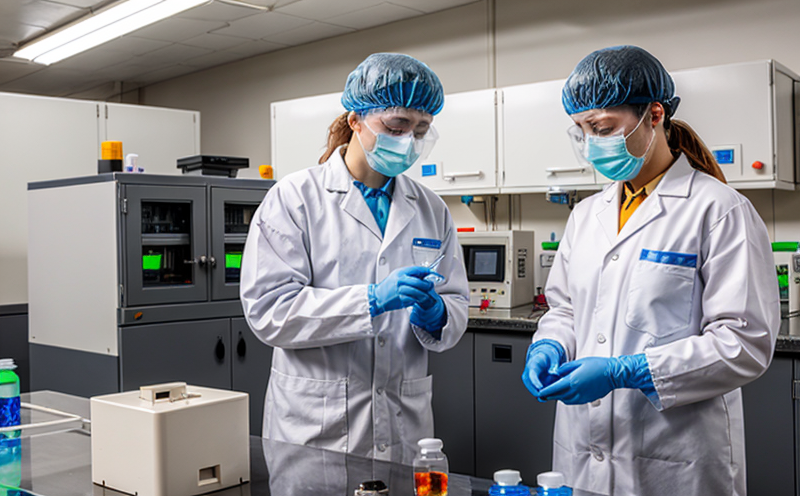EN 15342 Acrylamide Testing in Baby Foods
The European standard EN 15342 provides a harmonized method to determine acrylamide content in baby foods. This test is essential for food and feed testing laboratories aiming to ensure the safety and quality of infant products, given that acrylamide exposure can pose significant health risks, especially for vulnerable populations like infants.
Acrylamide forms during high-temperature cooking processes, particularly when carbohydrate-rich foods are heated in the presence of asparagine. This compound is classified as a probable human carcinogen by the International Agency for Research on Cancer (IARC), necessitating stringent quality control measures to monitor its levels in processed foods.
The EN 15342 method involves extracting acrylamide from baby food samples, followed by quantification using high-performance liquid chromatography (HPLC) with a suitable column and detection system. The process is designed to be sensitive enough to detect even trace amounts of acrylamide in complex matrices.
Given the critical nature of this testing procedure for infant health and safety, it requires meticulous sample preparation and handling to ensure accurate results. Sample types include ready-to-eat baby cereals, mashed potatoes, and other solid or semisolid foods specifically designed for infants. The method also accounts for potential interference from other compounds present in these samples.
The standard specifies detailed procedural steps, including the use of appropriate solvents for extraction, timeframes for incubation, and temperature conditions to be maintained during processing. Compliance with these guidelines is crucial to avoid any analytical bias that could lead to erroneous results.
Acrylamide testing in baby foods is not only a compliance requirement but also a proactive step towards safeguarding public health. Regulatory bodies like the European Food Safety Authority (EFSA) and national food agencies enforce this standard to protect consumers, particularly infants and children.
The importance of acrylamide testing extends beyond regulatory compliance; it reflects a commitment to product quality and safety that resonates with stakeholders across the supply chain, from manufacturers to retailers. By adhering to EN 15342, laboratories contribute significantly to maintaining consumer trust and ensuring that products meet stringent international standards.
Applied Standards
The primary applied standard for this service is the European Union's harmonized technical specification EN 15342:2019. This document provides a comprehensive protocol for measuring acrylamide in baby foods, which aligns with international guidelines and ensures consistency across different testing facilities.
The standard is designed to be compatible with other relevant international standards such as ISO methods for food analysis. Compliance with these standards underscores the reliability and accuracy of our testing methodologies.
| Key Step | Description |
|---|---|
| Sample Preparation | Involves thorough homogenization of the sample and extraction using acetonitrile. |
| Extraction | Carried out under controlled temperature conditions to ensure optimal recovery rates. |
| Cleanup | Utilizes solid-phase extraction (SPE) cartridges for removing potential interferences. |
| Analysis | Analyzed by HPLC equipped with a fluorescence detector. |
The use of these standards ensures that our testing procedures are robust, reproducible, and aligned with global best practices. This alignment is vital for maintaining the integrity of food safety data across various jurisdictions.
Eurolab Advantages
- Expertise and Experience: Our laboratory has extensive experience in conducting acrylamide tests on baby foods, ensuring consistent high-quality results.
- State-of-the-Art Equipment: We utilize advanced HPLC systems and other cutting-edge instruments to perform precise measurements.
- Comprehensive Reporting: Our reports include detailed method descriptions, raw data, and comprehensive interpretations of findings.
- Rapid Turnaround Times: Efficient processing times allow for timely delivery of results, crucial for regulatory compliance deadlines.
- Customer Support: We offer expert consultation on sample preparation and interpretation of results to assist clients in meeting their testing needs.
The combination of these advantages ensures that we are well-equipped to provide accurate and reliable acrylamide testing services, contributing significantly to the safety and quality assurance of baby foods.
Use Cases and Application Examples
- New Product Development: Manufacturers use this test during product development phases to ensure that new formulations do not exceed acrylamide limits set by regulatory bodies.
- Quality Assurance: Regular testing is conducted as part of an ongoing quality assurance program to monitor compliance with standards and identify any trends in acrylamide levels.
- Supply Chain Management: Suppliers use this test to verify the safety of raw materials before processing them into baby foods, ensuring consistent product quality.
- Retail Compliance: Retailers perform periodic testing on products they sell to ensure that all items comply with acrylamide limits and are safe for consumption.
| Use Case | Description |
|---|---|
| New Product Launch | Detecting acrylamide levels to ensure compliance before market release. |
| R&D Optimization | Optimizing cooking processes and ingredient selection to minimize acrylamide formation. |
| Supply Chain Monitoring | Verifying raw material safety from suppliers. |
| Regulatory Compliance | Maintaining records for regulatory inspections and audits. |
The diverse applications of acrylamide testing in baby foods highlight its critical role in ensuring product safety and regulatory compliance. Our laboratory is dedicated to supporting these efforts through accurate, reliable testing services.





